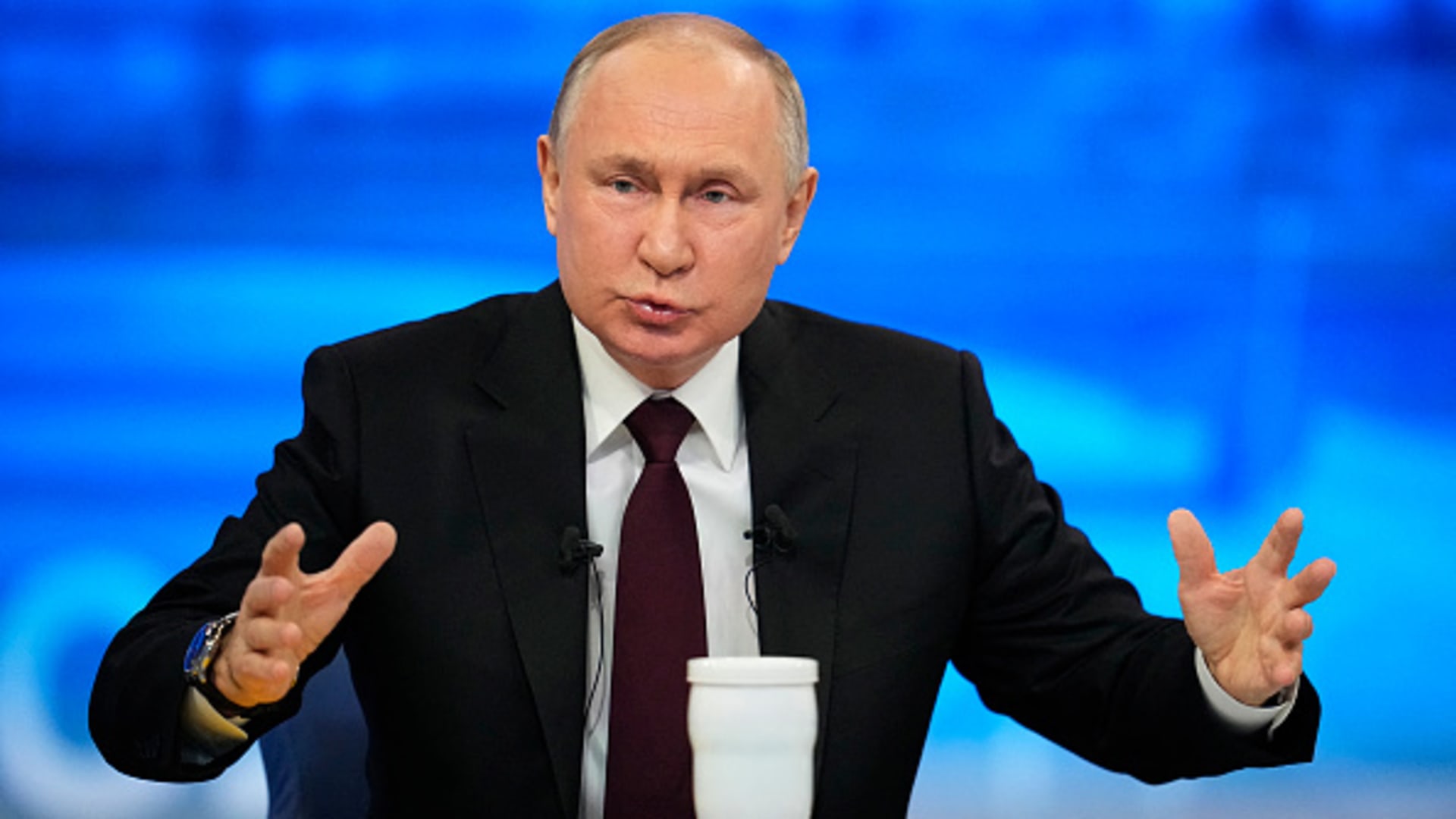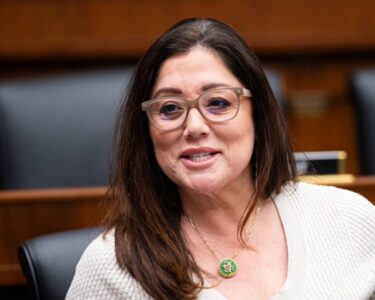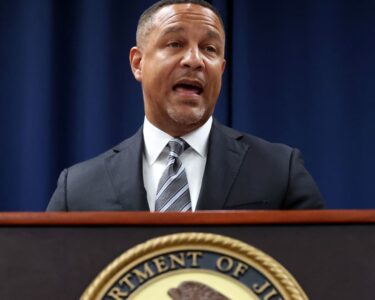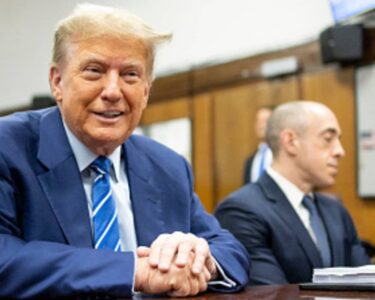This was CNBC’s live blog tracking developments on the war in Ukraine.
Russian President Vladimir Putin held his annual phone-in with the public on Thursday, combined with his end-of-year press conference, in which he covered a host of issues including what Russia calls its “special military operation” in Ukraine.
Putin said Russia’s goals in the country, which he claimed include its “demilitarization” and “neutral status,” had “not changed.”
“Either reach an agreement or resolve it by force. This is what we will strive for,” he said, according to a Reuters translation.
The “Direct Line with Vladimir Putin” is a closely followed event as it gives Russian citizens a chance to speak directly with the president on a range of issues and sees them invariably airing their grievances as well as heaping praise on the president. The event is a carefully orchestrated and curated affair, with questions heavily vetted and any criticisms focusing on localized issues rather than Russia’s leadership.
The phone-in’s organizers said they received several million questions for the president and the televised event lasted over four hours.
Meanwhile, talks got underway among EU leaders in Brussels, at a summit in which Ukraine is high on the agenda.
All leaders bar Hungary’s Victor Orban — who has retained tacit sympathy for Putin through the war — are set to approve the formal start of talks over Ukraine joining the bloc. However, a decision must be taken unanimously.
Orban told reporters Thursday morning he continued to believe talks should not begin because Ukraine has not met all of the criteria set out by the European Union. Orban is also expected to block the approval of a 50 billion euro ($54 billion) funding package for Ukraine in the EU budget, instead favoring a short-term, smaller package.
Talks are reportedly underway between European Union leaders over the enlargement of the bloc, after Hungarian Prime Minister Viktor Orban indicated he would remain the lone holdout on approving the formal start of talks over Ukraine’s accession.
Ukraine is a key issue at the European Council summit, at which leaders are also set to debate the approval of a 50 billion euro ($54 billion) aid facility for Kyiv, with the issues of accession and budget approval to be debated in tandem.
“Enlargement is not a theoretical issue. Enlargement is a merit-based, legally-detailed process which has preconditions. We have set up seven preconditions, and even by the evaluation of the [European] Commission, three out of the seven [are] not fulfilled, so there is no reason to negotiate membership of Ukraine now, even not to negotiate,” Orban said Thursday morning as he arrived at the summit in Brussels.
He also said that it was “easy” to give Ukraine money “in the short term” because this money was already approved in the EU budget.
In the long term and regarding the larger amount, he said this should be provided outside of the EU budget.
“But we are not under [time pressure] because the bridging solution is already in the budget,” Orban said.
The start of accession talks for Ukraine is supported by all other EU leaders, but must be agreed unanimously. While the talks would likely take months or even years, Ukraine is strongly hoping it can begin the process and secure additional funding from the EU while the future of U.S. funding remains in doubt.
The summit will continue Friday, and potentially into the weekend.
— Jenni Reid
Russian President Vladimir Putin was asked a question by what appeared to be an AI-generated “deep fake” of himself during a Q&A session with the public Thursday.
“Mr President, good afternoon, I am a student studying at St Petersburg Institute. Do you have a lot of twins? And another point, what is your attitude towards the dangers with neural networks and artificial intelligence?” the questioner asked, according to a live NBC News translation.
The question was met with laughter from the watching crowd, and a brief pause from a stern-looking Putin.
“I see you may resemble me and speak with my voice. But I have thought about it and decided that only one person must be like me and speak with my voice, and that will be me,” Putin responded.
The Kremlin recently dismissed long-standing speculation in the press and on social media that Putin uses body doubles at some events. Meanwhile, there is growing concern across the globe about the use of AI “deep fakes” to spread misinformation.
— Jenni Reid
In the final question of a marathon phone-in and press conference, Russia’s President Vladimir Putin was asked by a Kommersant journalist what advice or warning he would give to himself in the year 2000, just after he came to power.
In terms of advice, Putin said he would tell his younger self “you’re going on the right path, comrades.”
“You need to believe in the great people of Russia and this faith is key to rebirth and the strengthening of Russia,” he said.
Putin said he would warn his younger self against being naïve and “overly trusting towards so-called partners.” It’s uncertain who Putin was referring to but Russia has repeatedly complained about NATO’s expansion in recent decades, saying it had been assured that the military alliance would not expand eastward. Western officials have said no such assurances were ever given to Moscow.
Since Russia invaded Ukraine, NATO’s border with Russia has got even bigger as Finland joined the alliance earlier this year.
Wrapping up the more than four-hour phone-in and presser, Putin told the audience: “Please don’t be cross with me if I didn’t answer all of your questions, but it’s high time to wrap it up.”
— Holly Ellyatt
Russian President Vladimir Putin said Thursday that he hoped an agreement could be reached with the U.S. over a prisoner swap for the Wall Street Journal reporter Evan Gershkovich and U.S. Marine veteran Paul Whelan, but said talks were complex.
“We want to reach an agreement, and these agreements must be mutually acceptable and must suit both parties,” Putin said, when asked about the matter during his annual phone-in and press conference.
“It is not simple, I will not go into details now, but in general, it seems to me that we speak a language that is understandable to each other. I hope we will find a solution. But, I repeat, the American side must hear us and make an appropriate decision, one that suits the Russian side,” he said in comments translated by Reuters.
Marine veteran Whelan was arrested in 2018 and was convicted of spying for the U.S. in 2020 and sentenced to 16 years in prison. He also denies the charges, as does the U.S.
Journalist Gershkovich was arrested on charges of spying in March. He, the Wall Street Journal, and the U.S. deny the charges. The imprisonment of both men is seen as politically motivated.
Gershkovich remains in custody and an appeal against an extension of his pre-trial detention was rejected by a Moscow court Thursday.
The WSJ issued a statement, noting that “while we expected this outcome, it’s important that we appeal these rulings to call out the absurd nature of the charge.”
“Evan has been wrongfully detained for more than 250 days for simply doing his job as a journalist, and any portrayal to the contrary is fiction. We will stand with Evan and his family for as long as it takes and continue to demand his immediate release.”
— Holly Ellyatt
It would be difficult to rebuild relations with the U.S. as things stand, Russian President Vladimir Putin said when asked at his annual phone-in and news conference whether a normalization of relations was possible.
“When internal changes happen (in the U.S.), when they start respecting other people, other countries, when they start looking for compromise instead of trying to resolve their issues with sanctions and military intervention, then the fundamental conditions will be in place to restore fully-fledged relations,” Putin told the audience at his public phone-in and press conference Thursday.
“So far, such conditions are not in place, but we are ready for that,” he said, according to a Reuters translation.
Putin again blamed NATO for the deterioration of relations between Russia and the West, saying the military alliance had encroached upon Russia’s borders.
“The unbridled desire to creep towards our borders, taking Ukraine into NATO, all this led to this tragedy. Plus the bloody events in Donbass for eight years — all this led to the tragedy that we are now experiencing. They forced us into these actions,” he said.
“What the United States conceived and organized, Europe stands and silently watches, or plays and sings along with them there. Well how can we build relations with them?” Putin asked.
— Holly Ellyatt
President Vladimir Putin said Russian athletes should be competing at the 2024 Paris Summer Olympics, but added that the conditions under which they and Belarusian athletes will have to compete should be assessed.
The International Olympic Committee said last week that Russians and Belarusians who qualify for the Paris Games can take part as neutrals but must compete without their flags, emblems, anthems or any other identifications whatsoever of Russia or Belarus.
Putin said if the idea was to “cut off” Russia’s leading athletes then it’s not worth going to the games.
“What does it have to do with the athletes? Let them travel, and train, and so on,” he said in the combined phone-in and press conference Thursday, in comments reported by Reuters.
— Holly Ellyatt
Russian President Vladimir Putin said on Thursday that Russian forces were strengthening their positions on almost all fronts of the Ukraine war.
Putin said at his annual news conference that Ukraine had lost some of its best troops in an attempt to secure a foothold on the east bank of the Dnipro River in the Kherson region.
“I think it is stupid and irresponsible on behalf of the political leadership of the country,” Putin said. “It is a tragedy, I believe, for them.”
As the war approaches the end of its second year, Ukraine has achieved only small gains from a counter-offensive that began in June.
Russia, however, has also made no tangible progress since capturing the city of Bakhmut at heavy cost in May. It occupies about a sixth of Ukraine’s territory but does not fully control any of the four Ukrainian regions it claimed last year as part of Russia.
— Reuters
Putin has touched upon the thorny subject of mobilization, claiming that another draft was not yet needed in Russia as enough people had been drafted, or had volunteered to fight.
“We had a partial mobilization, we called up 300,000 people… The guys are fighting well, really well,” Putin said.
He claimed 1,500 were volunteering every day across the country and said around 486,000 military personnel had been contracted to fight since the start of this year.
“The flow of those who want to defend their homeland with weapons in their hands does not stop,” Putin said.
“So why do we need mobilization? As of today, there is no need for that,” he added, NBC News reported.
Putin also gave a rare insight into the number of Russian military personnel in Ukraine, claiming that 617,000 service members were currently involved in the “special military operation” in Ukraine.
Russia first launched a partial mobilization last year with the move prompting thousands of men of fighting age to leave Russia. Putin said he understood that the topic was a “sensitive matter.”
— Holly Ellyatt
Inflation in Russia could near 8% by the end of the year, Russian President Vladimir Putin said Thursday, during his first press conference since the full-scale invasion of Ukraine.
“Unfortunately, our inflation has increased, that’s true. By the end of the year, 7.5% is expected, maybe a little more, towards 8%,” Putin said, according to a Google translation of comments reported by Russian state news agency Tass.
“But the Central Bank and the government are taking the necessary measures. We can talk about this more, I mean raising the key rate and some other measures that the Central Bank and the government are taking. And we proceed from the fact that we will be able to return to the target indicators,” Putin added, according to the report.
Russian inflation was 7.5% year-on-year in November, up from 6.7% in October, national statistics showed, according to LSEG data.
The central bank has rapidly hiked rates this year to dampen price rises and also tackle weakness in the ruble.
— Jenni Reid
Russian President Vladimir Putin has speaking at his annual phone-in with the Russian public, which is being held alongside his end-of-year press conference.
On the Ukraine war, he said his country’s goals had not changed.
“There will be peace when we achieve our goals. Let’s return to these goals: they have not changed. I’ll remind you of what we talked about then: the denazification of Ukraine, its demilitarization, its neutral status,” he said, according to a Reuters translation.
“As for demilitarization, if they don’t want to come to an agreement, then we are forced to take other measures, including military ones. Or we will agree on certain terms. By the way we agreed on these in talks in Istanbul. But then these agreements were scrapped. But we agreed on this. There are other possibilities – either reach an agreement or resolve it by force. This is what we will strive for.”
Keen followers of Russian news and politics will be interested to see how much of Russian President Vladimir Putin’s public phone-in and press conference features the war in Ukraine, or “special military operation,” as Russia calls it.
Kremlin Press Secretary Dmitry Peskov told the Rossiya-24 television channel Wednesday that questions submitted by the Russian public ahead of the phone-in mainly relate to the “special military operation” in Ukraine and the “international situation.”
Peskov said many questions refer to “the special military operation in all its aspects,” such as the current situation in the war, Russia’s objectives and the future of servicemen who are returning from the battlefield, news agency Tass reported.
Russians are also asking Putin “whether the Russian economy and social sphere are resilient enough and whether the state will continue to fulfil its social obligations,” the news outlet added.
It’ll be interesting to see how many of these thorny issues are actually posed to Putin in the carefully curated combined phone-in and end-of-year press conference, particularly given reports that the president wanted to avoid focusing on the war ahead of the 2024 election.
Peskov said the president prepares thoroughly for the event, reviewing questions grouped in main thematic blocks. The Kremlin spokesperson said none of the messages will be left unanswered and all problems reported by citizens will be resolved within the next year.
The Kremlin had received a huge amount of support for Putin from Russian citizens ahead of the event, Peskov claimed. It’s been reported that over two million calls and messages have been made by Russian citizens posing questions for the president.
— Holly Ellyatt
Russian President Vladimir Putin has a busy day ahead of him, with his annual “Direct Line” phone-in being combined this year with his year-end press conference, known as “Results of the Year.”
Previous events have lasted over four hours, with Putin answering up to 70 questions from the public and press. This year’s combined event begins at 9:00 a.m. London time.
The events take place against a backdrop of Putin’s decision, made last Friday, to run for office again in the March 2024 election. With little to no “non-systemic” opposition in Russia, he is highly likely to win the vote, keeping him in office until 2030.
The two-in-one press conference and “Direct Line” format was also used in 2020 when the Covid-19 pandemic gripped Russia and the rest of the world. The last combined event lasted almost four and a half fours, and the head of the state gave answers to 50 questions asked by journalists and citizens, Tass news agency noted Thursday.
This time, correspondents from federal and regional media outlets, as well as foreign journalists accredited in Russia, will be present in the hall, the state-run news agency noted.
The discussion will be moderated by Kremlin Spokesperson Dmitry Peskov, Channel One TV host Ekaterina Berezovskaya and Rossiya-1 journalist Pavel Zarubin.
— Holly Ellyatt
The Kremlin claimed Wednesday that the West is likely to be gripped with what it described as “Russophobic outbursts” ahead of Russia’s presidential election in March 2024.
“During these Russophobic outbursts, the election campaign will definitely be the main target,” Kremlin Spokesperson Dmitry Peskov told Russian television channel Rossiya-24.
“They are struggling to comprehend the level of consolidation in society, the level of public support for the president even before the start of the election campaign,” Peskov told the network, according to comments published by Tass news agency.
Russian President Vladimir Putin announced last Friday that he would run for reelection as he met Russian soldiers who had fought against Ukraine. In the apparently choreographed moment on Russian television, Putin was asked by one of the war veterans to run for president again.
Putin responded by saying, “I will not hide that I have had different thoughts at different times but it is now time to make a decision,” according to comments reported by Reuters. “I understand that there is no other way.”
“I will run for the post of president,” Putin said.
Peskov told Rossiya-24 that the Kremlin had received a huge number of messages of support for the president ahead of his public phone-in on Thursday in which the president answers (highly curated) questions from the public on a variety of issues ranging from potholes to pensions.
“There [in the West] it is impossible to understand this,” Peskov said, before claiming the election campaign would be the target of unspecified “attacks.”
“Moreover, the hybrid war against us is still ongoing. In these conditions, the election campaign merely cannot but be a target for attacks. On the other hand, we have acquired some immunity against such attacks. I am sure this immunity will work,” Peskov added, without providing further detail.
— Holly Ellyatt
Nordic leaders on Wednesday reaffirmed their “unwavering support” for Ukraine, following talks and a news conference during a visit by Ukrainian President Volodymyr Zelenskyy.
“We convey our deep respect for and recognition of the persistence and spirit of the Ukrainian people, soldiers and leadership,” the prime ministers of Norway, Denmark, Iceland and Sweden and the president of Finland said in a joint statement.
They called Ukrainian resistance a “fight for our common security and fundamental principles of international law,” and said this was why they had collectively provided military and civilian support and humanitarian assistance to Ukraine totalling around 11 billion euros ($11.8 billion) since February 2022.
The leaders said this would continue individually and collectively, and that “the Nordic countries will stand with Ukraine for as long as it takes.”
Military contributions from the Nordics have included training and the provision of air defence systems, artillery systems and munitions, Leopard tanks, armored combat vehicles, field medical support and mine clearance equipment.
The countries remain committed to increasing international pressure on Russia through sanctions, the leaders said, and to Zelenskyy’s Ukraine Peace Formula, a list of conditions for Russia which includes the re-establishment of Ukraine’s internationally recognized borders.
— Jenni Reid
Germany will continue to support Ukraine for as long as necessary despite adjustments and cuts to its budget, Chancellor Olaf Scholz said in a press conference on Wednesday.
This includes weapon deliveries, financial support for Ukraine’s budget and assistance for Ukrainian refugees in Germany, Scholz explained.
If the situation in Ukraine changes, “we will have to react,” which could include requesting an emergency exception for Germany’s budget, he said. This would allow Germany to expand its monetary support for Ukraine.
Finance Minister Christian Lindner said 8 billion euros ($8.6 billion) was currently allocated for “direct, bilateral support for Ukraine” in 2024.
— Sophie Kiderlin
Russia’s ambassador to the U.S. poured scorn on Ukrainian President Volodymyr Zelenskyy’s trip to the U.S. this week, stating that “everyone is tired of the beggar from Kyiv.”
“Zelensky’s trip turned out to be empty,” Ambassador Anatoly Antonov said on the Russian embassy’s Telegram channel.
“It was not possible to convince that Ukraine is more important than the security of the United States. Everyone is tired of the beggar from Kyiv,” Antonov claimed.
Antonov’s comments come a day after Zelenskyy met his U.S. counterpart Joe Biden as well as lawmakers from both parties as he pressed home Ukraine’s need for additional funding to help it to continue to fight Russia’s invasion.
The U.S. also announced on Tuesday further, sweeping sanctions on more than 250 individuals and entities accused of helping Russia to evade sanctions imposed on it following its invasion of Ukraine. It also announced a new package of weapons and equipment for Kyiv.
Antonov said the measures would not work, and would not help Ukraine, saying that “restrictions and supplies of military products will not affect Russia’s foreign policy priorities.”
“The anti-Russian steps announced today – new sanctions and another shipment of weapons – are nothing more than an attempt to put a good face on a bad game. Nothing will help Zelenskyy,” he added.
“The Americans risk getting even more bogged down in the quagmire of the Ukrainian conflict,” he said.
— Holly Ellyatt
The European Union’s chief executive called on Wednesday for the bloc to support Ukraine as long as it takes, her remarks ahead of a key European leaders’ summit standing in sharp contrast with Hungary’s criticism of giving more aid to Kyiv.
Hungary is opposed to granting Ukraine more financial aid and has threatened to veto plans to advance Kyiv’s EU membership bid at a summit of the bloc’s leaders in Brussels on Thursday and Friday.
Ukraine is looking to the summit for a positive signal on its future in the European Union and existential budget aid as the country is increasingly exhausted from nearly two years of fighting a war against a Russian invasion.
“As the war drags on, we must prove what it means to support Ukraine for as long as it takes,” European Commission President Ursula von der Leyen told the European Parliament ahead of the leaders’ summit.
Her Commission has proposed that the summit takes a decision this week to start EU membership talks with Ukraine once it meets the four outstanding conditions set out previously to advance Kyiv’s EU hopes. The Brussels EU executive suggested that could happen in March.
Von der Leyen said on Wednesday the laws Ukraine passed last week — including on national minorities, an issue raised by Hungary — cleared three of the remaining tasks, meaning that only one was missing: a new lobbying law to rein in oligarchs.
While EU officials and Budapest say they may work around Hungary’s opposition to a proposal to give Ukraine 50 billion euros ($54 billion) in economic aid through 2027, advancing Ukraine’s European aspirations requires unanimous backing of all the bloc’s 27 states.
Hungary — whose Prime Minister Viktor Orban boasts about his ties with Moscow at a time the bloc is trying to isolate it for waging the war against Ukraine — has dug its heels in, setting the stage for a showdown at the year’s final summit of EU heads.
— Reuters
Over 50 people have been injured after Russia targeted the Ukrainian capital Kyiv with ballistic missiles overnight, city officials said Wednesday.
A hospital, school, kindergarten, morgue and residential buildings were damaged in the attack, Kyiv’s Mayor Vitali Klitschko said on Telegram, with the latest update stating that 53 people were injured. Twenty of them, including two children, were hospitalized as a result of the strikes.
Images taken in the city show the extent of the damage caused by the latest attack:
— Holly Ellyatt
Russia slams Zelenskyy, says ‘everyone is tired of the beggar from Kyiv’; Ukrainian capital attacked






